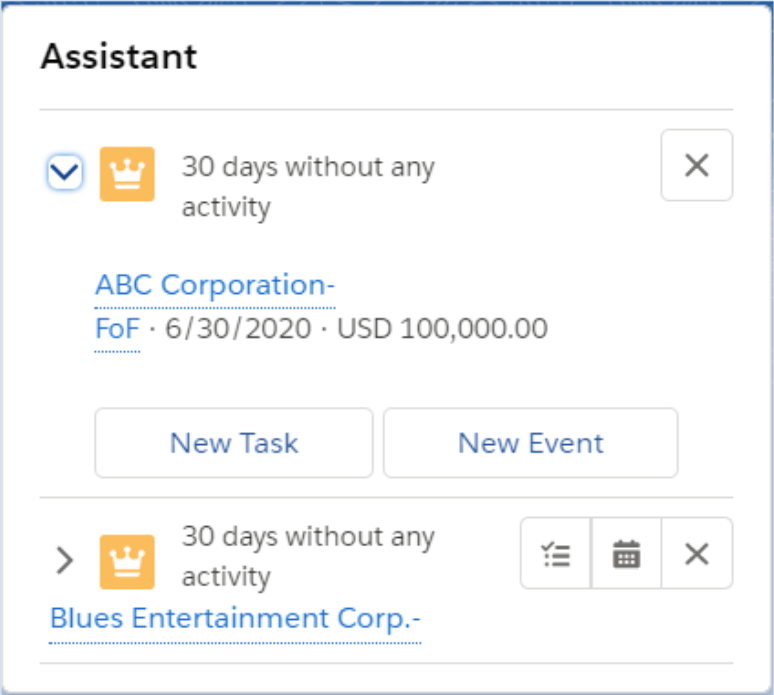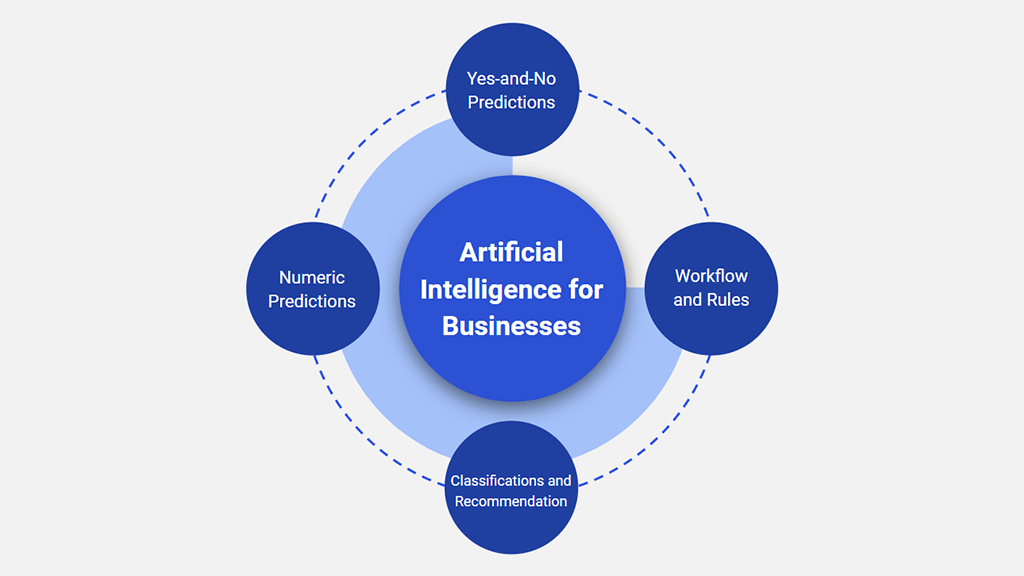Sugar, spice, and ‘everything nice’? Salesforce almost has it all now that Einstein, the smart CRM assistant, is already at our service. Einstein was first introduced as part of the Salesforce Spring ‘17 release and is now a component of Salesforce core cloud products. This innovation was built for the Customer Success Platform to break down the complexity of artificial intelligence technology, helping customers leverage AI capabilities. It must be Salesforce’s swift response to the rapid fourth industrial revolution, yeah? But what exactly is Einstein, and how will it impact the user and customer experience?

Salesforce Einstein is a form of AI—a smart virtual assistant to be exact— that is native to Salesforce. It has out-of-the-box features embedded to Salesforce cloud apps already automating tasks to assist users, giving relevant insights, or eagerly suggesting what your next actions should be, without waiting for your command.

Here’s the simplest example:
The Assistant component from the homepage shows Opportunities without activity for the last 30 days followed by quick action buttons: Create an Event or Task? You need to just keep on moving!
Exploring Artificial Intelligence
Artificial Intelligence has made its way to different industries like Manufacturing, Healthcare, Education, Marketing, eCommerce, and financial services. We know you’ve already heard about AI way back the early 2000s from sci-fi movies and shows. It feels spectral, isn’t it? Years later, who would have thought that we are going to be surrounded by AI and even interact with it. But it is not something like villain robots or super smart programs that can turn the world upside down. AI technology brings the best out of data with accuracy by means of its deep learning and analytic ability. Salesforce made it extra by harnessing the power of AI into its cloud platform allowing users to experience AI at hand without an entire AI developer Team:

Yes-and-No Predictions come in the form of probability. An example of this is a Lead scoring that will let Sales Reps analyze which Leads should be prioritized. Leads with a high rating correspond to a high probability of it being converted. Numeric Predictions answer questions such as “How much revenue can this Opportunity bring?” or “How many members can this campaign target?”. Both of these predictions use historical data. Classifications, on the other hand, use deep learning to make sense of unstructured data. An example of this is if you are a shoe vendor, you’ll know what kind of shoes are trending based on middle-aged women purchases. Recommendations make the job easier for users or customers who are selecting products or services options from a large set of items. Lastly, Workflow and Rules play an integral part in automating tasks based on the predictions, classifications, or recommendations.
Just like Google’s Assistant, Apple’s Siri, or Amazon’s Alexa—companies that use Salesforce CRM can now build their own Smart Assistant. To give a more personalized experience and to meet unique business requirements, Salesforce provides robust tools for admins and developers through the Einstein Platform. Below is a table that breaks down what einstein platform is made up of and its usage:
Platform Products | Description | Usage |
|---|---|---|
Einstein Bots | Customer service smart assistant in different channels such as chat, messaging, or voice. | Support Website Chatbot |
Einstein Voice | It allows users to talk to Salesforce through voice recognition from any device. | Update Records Voice Command |
Einstein Prediction Builder | Point-and-click wizard for creating custom fast predictions on your non-encrypted Salesforce data. | Predict possible customer Attrition |
Einstein Next Best Action | It gives users rules-based intelligent recommendations and offers them to users for customers. | Automate best recommendations for customer discount offers based on combinations of rules or propositions. |
Einstein Discovery | It provides an easy-to-comprehend outcome prediction based on relevant data patterns. | Discover detailed factors affecting possible customer Attrition (e.g.cultural reasons) |
Einstein Vision and Language | Salesforce developers can add deep learning capabilities with sets of APIs and services to interpret and classify unstructured data. | Get social media trends related to your products and interpret the data so you can improve your marketing strategies. |
Imagine this flashing before your eyes, the best promo automated suggestions to give to your loyal customers based on your Salesforce data, or a Support messaging bot so that customers won't need to login to their computers if they have urgent requests. Or, have you ever wondered if you could get a visual predictive report about possible customer attrition so you can make an advanced strategy to prevent the loss in a blink of an eye? How about a brilliant product recommendation specifically tailored for customers to increase your monthly sales? These outcomes are possible with Einstein: Discover, Automate, Predict, and Recommend. All of it is centered on customer success while offering users more time to focus on their vital tasks and a whole new perspective in viewing their Salesforce data.
The Sales Cloud Einstein can interpret your data to determine what turns a deal into a sales and then it identifies your top leads and what to do with them next. It can turn your data into a closed deal using AI. With Service Cloud Einstein, it is a powerful tool that makes customer service smarter and more effective. It can empower organizations to increase their productivity by providing real-time, cross channel insights, can classify cases i.e for escalation and categorize them as they come. In Commerce Cloud, smart, timely product recommendations for customers are made easy boosting your company’s revenue. Salesforce Einstein has brought a massive change to all Salesforce platforms. No joke! Thanks to AI, Einstein’s model could learn, get smarter, automate customizations, and self-align to meet customer’s needs across Salesforce's cloud platforms. The more the data, the merrier!
Another core feature that Einstein brings to all types of businesses is Einstein Analytics. Analytics gathers and arranges your data in datasets, lenses, dashboards, and apps. These collections are called 'Analytics assets.' Analytics assets depict levels of data refinement—from raw data to well-organized, 'packaged views' of your data. Salesforce already has the standard reporting capabilities but with Einstein Analytics, they lead the game to the next level.
What is Einstein Analytics?
Einstein Analytics is a self-service application that enables users to interpret large amounts of data by efficient visualizations of the current or even the future shape of your business. Salesforce data combined with data coming from other sources are collected into related sets of information. This collection of information is called a dataset that can be scrutinized and analyzed to get solutions needed for the business. Users can collaborate on their insights without leaving the CRM.
Einstein Analytics Studio
Analytics Studio is where you can build AI-powered analytics apps from scratch or use prebuilt templates. Here’s an example of the UI where you can use AI with no code.
A jumpstart wizard will guide you in exploring your data. There’s also a selection of prebuilt templates that will make the job easier and convenient.


An example of an interactive Performance Summary Dashboard created using a template.
An Einstein Analytics App organizes data projects, dashboards, and control visibility. This is where you can explore data and run presentations. A Lens is a visualization of data in a dataset where users can view data graphically and perform filtered queries. Similar to a page in Lightning Experience that comprises multiple Lightning components, a Dashboard is made up of a gallery of widgets. Dataflow is designed to arrange the course of data from extraction to transformation. It is then used to create one or more datasets based on data from Salesforce objects or existing datasets. A dataflow is a set of instructions, and it can be used to specify which datasets should be available for querying.
Interactive exploration is the magic word that describes Einstein Analytics. Sales Managers or Support Directors can now have a better vision and unique insights to make incomparable customer experience and attain customer success.
There you go! Salesforce Einstein’s ‘A.I. for All’ promises us a new and easier scheme for interacting with data! I’ll bet that there's a lot more to look out for, so isn’t now the perfect time for a Salesforce upskill? Before mastering Einstein Analytics and Discovery, you would need sufficient knowledge on data management, modeling, and migration, so let’s first get you prep-up with Data Architecture and Management basics. Check out the detailed study guide here and increase your knowledge with these realistic practice exams.
What Certification are you studying for now?
Focus on Force currently provide practice exams and study guides for nine certifications









